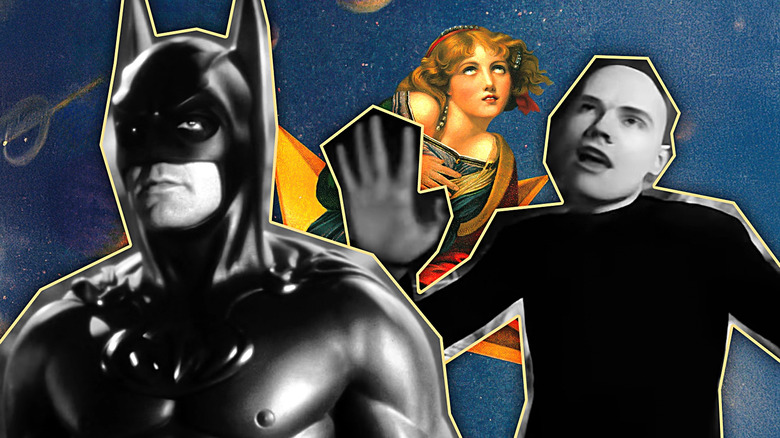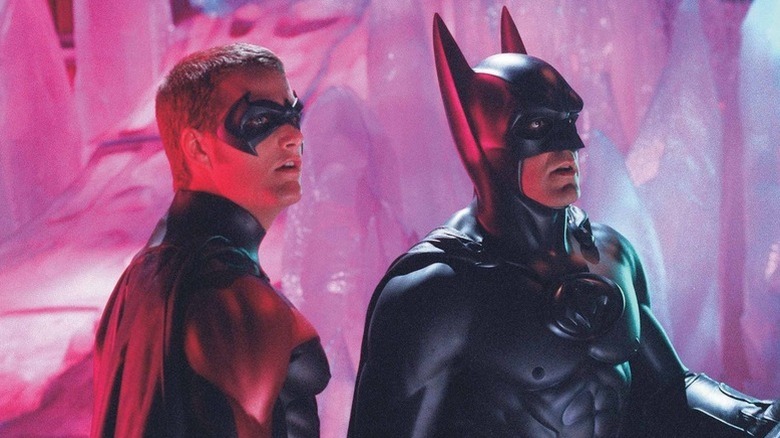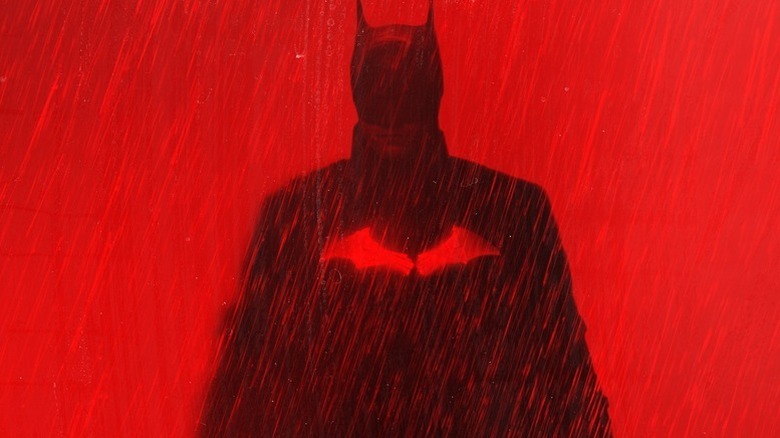Why Smashing Pumpkins Was Reluctant To Write The Theme Song For Batman & Robin
We may receive a commission on purchases made from links.
The 1989 "Batman" film, directed by Tim Burton, is a culturally pivotal movie. Its impact on Batman the character is hard to overstate, but for me, the most important part of the movie's legacy is Danny Elfman's score. His main "Batman" theme is legendary; the images of Batman moving through the shadows and standing atop a skyscraper or gliding above them are now inseparable from Elfman's orchestral horns.
But back in the 20th century, "Batman" movies didn't just have original scores, but tie-in songs from star musicians. Prince recorded a whole album for "Batman," including songs that appear in the movie (even diegetically; the Joker's gang brings a boombox along while trashing an art museum). For "Batman Returns," Elfman teamed up with Siouxsie and the Banshees for the single "Face to Face."
Joel Schumacher's two Batman films, "Batman Forever" and "Batman & Robin," kept up the licensed music. The "Forever" soundtrack includes a rerelease of Seal's 1994 song "Kiss From A Rose" and the original "Hold Me, Thrill Me, Kiss Me, Kill Me" by U2. (This was not the last time U2's The Edge composed a Batman song.)
The lead song on the "Batman & Robin" soundtrack is "The End Is the Beginning Is the End" by the Smashing Pumpkins — one of the best alt-rock bands to emerge in the '90s. But can you be that popular and still "alternative"? That's the question that Smashing Pumpkins' frontman Billy Corgan was asking himself at the time. Speaking to MTV with Schumacher in 1997, Corgan described how writing a song for a Hollywood blockbuster felt like selling out — and then how he pushed those feelings down.
"At one point I found myself going, 'I can't write a song about Batman, I'm in an alternative band.' And I thought this is stupid, if I can write a song about Batman and it serves the purpose, which is to make it happen and connect with the movie, and connect with something that is unique and original, then, why not?"
The Pumpkins had reached the mainstream five years into their band's founding, thanks to their masterful second album, 1993's "Siamese Dream." Then they kept the momentum with their 1995 third album, "Mellon Collie and the Infinite Sadness." They were big enough to guest star on "The Simpsons" in the season 7 episode "Homerpalooza" in 1996 (along with Peter Frampton, Cypress Hill, and Sonic Youth), and then to write a Batman movie song in '97.
Was Corgan's burst of self-doubt worth it? Is the song any good? Yes, it is, but it's a puzzling fit for the movie.
Why Batman & Robin featured the Smashing Pumpkins
"Batman & Robin" is famously a lighthearted and campy movie. The bright colors, humor, and action figure costume and prop design were there to reel in the kids. The movie took after the 1960s "Batman" TV series, but in the wake of the Burton movies, "Batman: The Animated Series," and Frank Miller's already-legendary "Batman" comics of the 1980s, that wasn't what most Bat-fans were looking for at the time.
So, with that being the movie's tone, who thought it was a good idea to get Smashing Pumpkins to write a song for it? Schumacher said in the aforementioned MTV interview that he was a fan of the band, but still. Smashing Pumpkins are known for dark, angsty lyrics composed together with loud guitar riffs. Their songs at the time were all about dissatisfaction with the world, projected into rage or self-loathing. ("Despite all my rage, I am still just a bat in a cage"?) The Pumpkins' music explored yearning for (self) acceptance beneath feelings of regret ("Mayonnaise"), living with lingering scars of abuse ("Disarm"), and suicidal ideation ("Today"). The songs' meanings can be deceptive if you don't listen closely or just focus on the key refrains, but either way, it's not music for the target audience of "Batman & Robin."
"The End is the Beginning is the End" is no different from that; it's about alienation and watching the world that left you feeling that way collapse. Tellingly, the song's music video is much darker than the movie.
The video, directed by Jonathan Dayton and Valerie Faris, opens on a giant Batman cowl. The camera zooms in through one of the eye holes, revealing the Pumpkins all dressed in black jumpsuits. They start playing as scenes from the movie are projected behind them; it's like the song/dancing is representative of the turmoil in Batman's very mind. Corgan, who doesn't have his usual guitar, stretches his arms out like a bat as he sings. (A bullet with bat wings, perhaps? Okay, I'll stop.)
The explanation for this tonal mismatch is that "Batman & Robin" was an extremely commercial movie. Smashing Pumpkins were a very popular band at the time, so it made sense to try and pique their fans' interest. The "Batman & Robin" soundtrack includes many other big names in music at the time. As Corgan recounted in 2022 (at his Chicago cafe Madame ZuZu's), he and his bandmates were promised that "The End is the Beginning is the End" would be the end credits' song. At the premiere — where Corgan fell asleep — "I love Joel, but God, the movie's terrible!" — the frontman discovered this meant the song was only the first one played, for about a minute, during the credits before a different licensed song would kick in.
Smashing Pumpkins wrote the perfect Batman song 25 years too early
"Batman & Robin" was panned and remembered for all the wrong reasons. But "The End is the Beginning is the End" enjoys a legacy outside of it. It was included as a track on the 2014 reissue of the Pumpkins' fourth album, "Adore," where you can listen to it without knowing its Bat-roots.
About 10 years later, the trailer for Zack Snyder's "Watchmen" featured a slower remix of the song, retitled "The Beginning is the End is the Beginning." At Madame ZuZu's, Corgan said he thinks the "Watchmen" trailer is the best movie trailer ever. Say what you will, but Zack Snyder movies always have the best trailers. Corgan's song being in that "Watchmen" trailer is his "revenge" for the song originally being attached to "the worst Batman movie." (The "Watchmen" movie itself? Another "piece of sh*t," per Corgan.)
Lyrically, the song fits "Watchmen" (a movie about the Cold War and possible nuclear annihilation) better than it ever did "Batman & Robin." But you know what else it fits? A different and more recent "Batman" picture — Matt Reeves' 2022 "The Batman."
"The Batman," and specifically its version of Batman (Robert Pattinson), is steeped in the grunge aesthetic that Smashing Pumpkins itself grew out of. Upon release, reviewers described "The Batman" as an emo version of Bruce Wayne. Pattinson's Caped Crusader didn't decide to become Batman because he fell into a cave full of bats, Bat-fans joke — He just listened to My Chemical Romance's album "The Black Parade" and must've misheard "bad man" as "Batman" on the "House of Wolves" chorus.
This isn't all jokes either. "The Batman" leans on the grunge influence. Matt Reeves has said he modeled his Bruce Wayne in part on Nirvana singer Kurt Cobain. In addition to Michael Giacchino's superlative "The Batman" theme, this Dark Knight has a second anthem. That would be Nirvana's "Something in the Way," which plays twice during "The Batman." Reeves listened to the song while writing the script, and it led him to inspiration.
"It came to me that, rather than make Bruce Wayne the playboy version we've seen before, there's another version who had gone through a great tragedy and become a recluse."
So, while "The End Is the Beginning Is the End" doesn't really fit "Batman & Robin," it could fit "The Batman." The more melancholic "The Beginning is the End is the Beginning" version, specifically, strikes a similar chord as "Something in the Way." (The original is a bit too headbanging and guitar-heavy.) This part of the chorus perfectly fits Pattinson's dark and reclusive Batman:
"Does it make you happy,
You're so strange?
And in your darkest hour,
I hold secret's flame,
We can watch the world
Devoured in its pain."
If Reeves wants to sample a different musical theme for "The Batman Part II," he could do a lot worse than Smashing Pumpkins' 1990s heyday — "The End Is the Beginning Is the End" included.


